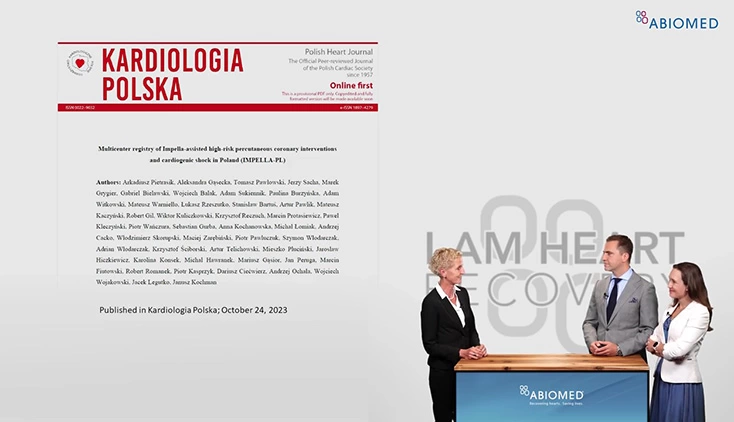Purge Management, Anticoagulation, Protected PCI
Heparin-free Purge Help Manage Anticoagulation in Patients Supported with Impella Heart Pumps
Christophe Vandenbriele, MD, PhD discusses managing anticoagulation in patients supported with Impella heart pumps, highlighting the use of sodium hydrogencarbonate-based (also called "bicarbonate") purge fluid for Impella heart pumps. Prof. Dr. Vandenbriele is a cardiologist and intensivist at University Hospitals, Leuven, Belgium and honorary research fellow at Royal Brompton Hospital, London, UK. This discussion was part of a larger Protected PCI webinar featuring presentations by Chuck Simonton, MD, and Vasileios Panoulas, MD.
After describing the disease- and device-related challenges of managing patients supported with Impella heart pumps in ICU, Prof. Dr. Vandenbriele explains that these patients receive heparin from both systemic administration and the Impella purge fluid. Unfortunately, data shows that in 41% of patients heparin administration is not adjusted to account for varying heparin levels delivered from purge fluid. “So we might risk some over- or underexposure of heparin in those critically ill.” Interestingly, he also notes that among a group of patients he analyzed, appropriate anti-Xa levels were reached in 61% of patients with just the heparin provided by the purge fluid.
Prof. Dr. Vandenbriele then discusses the option of bicarbonate-based purge fluid in patients who cannot tolerate heparin. He explains that bicarbonate increases pH and also binds calcium in the same way as heparin, thus preventing coagulation activation. Thus, Vandenbriele explains, adding 25 mEq/L of bicarbonate to the purge has been shown to be as effective as adding heparin to the purge solution.
He shares a patient case report illustrating the benefits of switching a patient from a heparin-based purge fluid to a bicarbonate-based purge fluid. “When we started the bicarb, the purge pressure remained exactly the same. So there was no evidence at all that there were increased purge pressures at that stage. And when we removed the pump after a couple of days it was nice and clean and there was no thrombus formation.”
Prof. Dr. Vandenbriele concludes that bicarbonate containing purge solution (BPPS) results in:
- Simplified anticoagulation management
- Reduction of heparin-related risks, such as heparin-induced thrombocytopenia (HIT) and overanticoagulation
- A safe alternative in patients with major bleeding
- Optimized pump motor durability
In the discussion that follows Prof. Dr. Vandenbriele’s presentation, Chuck Simonton, MD, adds that Abiomed is working on a new luer lock to replace the existing yellow luer connector on the Impella that can break down with exposure to sodium bicarbonate. Prof. Dr. Vandenbriele also clarifies that there is only 12.5 mL of sodium bicarbonate in half a liter of dextrose purge solution, “so the systemic effect is almost negligible.”
Sign Up for Latest Updates
IMP-3766


